‘This isn’t 1939, it’s 2022’: The families with nothing to live on aren’t going away
Poverty, hunger and hardship shames modern Britain and is an indictment of decades of policy that has dehumanised people and torn apart Britain’s social safety net. Ben Chapman speaks to families who can no longer cope

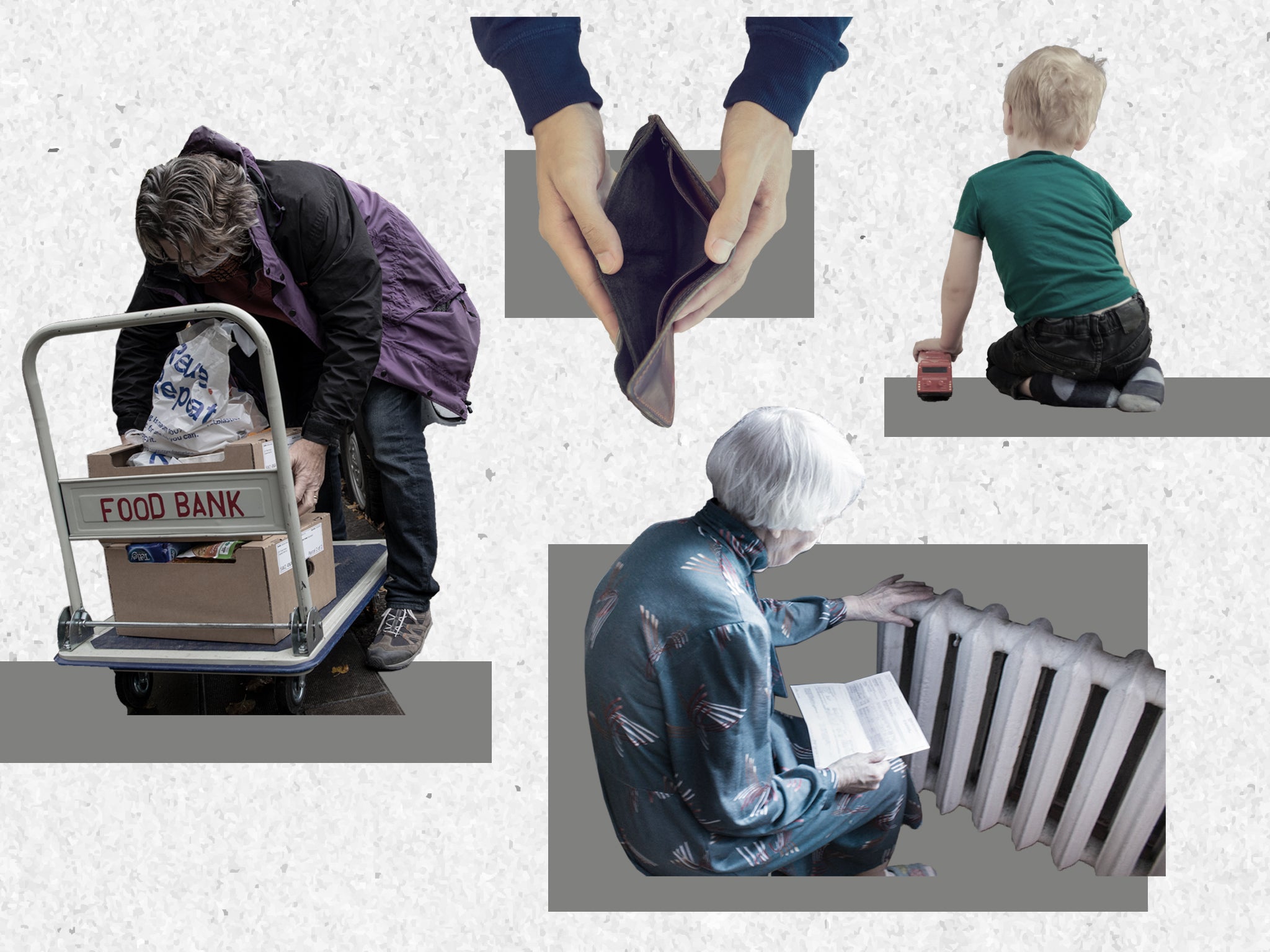
Lexie spends much of her life confined to her bedroom, unable to afford electricity for the stairlift that links her to the outside world. “I’m pretty much segregated from my family now. The lift is just energy consumption that I don’t need to be using,” the 48-year-old says, battling through a persistent, hacking cough; a symptom of recurrent bouts of pneumonia that can’t have been helped by her freezing cold home.
Osteoarthritis, among a host of other conditions, means she struggles to make the journey downstairs without assistance. Her four boys – aged between eight and 18 – always come first, but even for them, warm showers have become a once-weekly indulgence. Hot water must be carefully rationed if there’s to be enough to go round.
The rest of the time, at the family’s home in rural Wales, a kettle is heated on the stove and the kids try their best to wash themselves with a flannel.
“We shouldn’t be living like this,” says Lexie, who asked for her real name not to be used. “This isn’t 1939, it’s 2022.”
So, 2022: a year that it was hoped would bring renewed optimism as the world finally emerged from the grip of a pandemic. Instead, it will be the year that brought the biggest drop in living standards since records began.
The chancellor, Rishi Sunak, has not answered the increasingly desperate pleas from charities and campaigners to help Britain’s poorest pay for essentials such as energy and food. As a result, 1.3 million people will be plunged into destitution this year. By next winter, as many as 8.5 million people are expected to be living in fuel poverty, and almost half of all children will grow up in households that cannot afford basic goods.
Soaring energy prices, pushed higher still by Russia’s invasion of Ukraine, have brought with them the spectre of further turmoil. Petrol, food, clothing, electricity; all are going up much faster than wages, stretching household budgets beyond breaking point.
Boris Johnson’s government has sought to push the line that it is powerless – a victim of international forces beyond its control. The truth, say economists and anti-poverty campaigners, is that Britain entered this year hopelessly unprepared after decades of policy choices that have left ordinary Britons vulnerable, fearful and unable to cope with the shock that lies ahead.
For large numbers of families like Lexie’s, the cost of living crisis is not new. It is a grim reality they have been living with for years. They no longer have any resources left to fight and they are terrified of what lies ahead.
The families we speak to have been up against it for years. They’ve got no savings, they’ve got nothing left to fall back on
There are no further sacrifices that can be made. The essentials for a dignified life are already gone. Life goes by precariously on a financial cliff edge; counting grocery budgets to the penny, huddling under blankets, rationing heating oil, avoiding social occasions, missing birthday presents.
Sara Ogilvie, director at Child Poverty Action Group, often hears from parents who are going hungry to ensure their children are fed. For groups such as CPAG, the current attention being given to soaring prices and stretched budgets is welcome but bittersweet. The question is, why is it only becoming an issue now that people on middle incomes are affected?
The term “crisis” is also one that grates, because it implies that the situation is sudden, unavoidable, and caused solely by outside forces. In fact, it is none of those things, says Ogilvie. “The families we speak to have been up against it for years. They’ve got no savings, they’ve got nothing left to fall back on. They’ve got absolutely nowhere left to turn at this point.”
Ogilvie’s view, backed up by a significant body of evidence, is that widespread poverty is a political choice, not an economic necessity. Inequality rose rapidly in the UK during the 1980s because of policy choices, and has remained stubbornly high ever since.
Campaigners fear that many people who have struggled to keep their heads above water will soon be pushed under by a rapidly rising tide of poverty and destitution.
These are just some of their stories.
Lexie, north Wales
“Me and my husband try to eat one proper meal a week. The rest of the time we pick at toast,” Lexie says. This meagre diet is supplemented with their children’s leftovers, if there are any.
Money has always been tight, but things deteriorated rapidly when her husband lost his construction job during the pandemic. He was told, without notice, that his services were no longer required. The family’s already precarious situation rapidly became unsustainable as Britain’s welfare safety net – threadbare after years of cuts – failed to catch them.
It was nine weeks before the first universal credit payment arrived. In the meantime, £300 of savings that the couple had scrimped together over many months evaporated within days amid a flurry of bills. Nothing extravagant: rent, internet, phone, food. They now have a mounting pile of debts they have no way of paying.
The daily indignities are tough, but it’s the special occasions that are truly heartbreaking, Lexie says. On her youngest son’s birthday, she couldn’t afford a present; only a card with a short note promising a gift at some point in the future. She couldn’t bear to tell him the truth: that she has no idea when, or indeed if, that day will ever come.
Adding insult to injury is the social stigma: a persistent narrative that people receiving benefits are at fault; that they are lazy, or abusing the system, living a life of relative luxury on handouts.
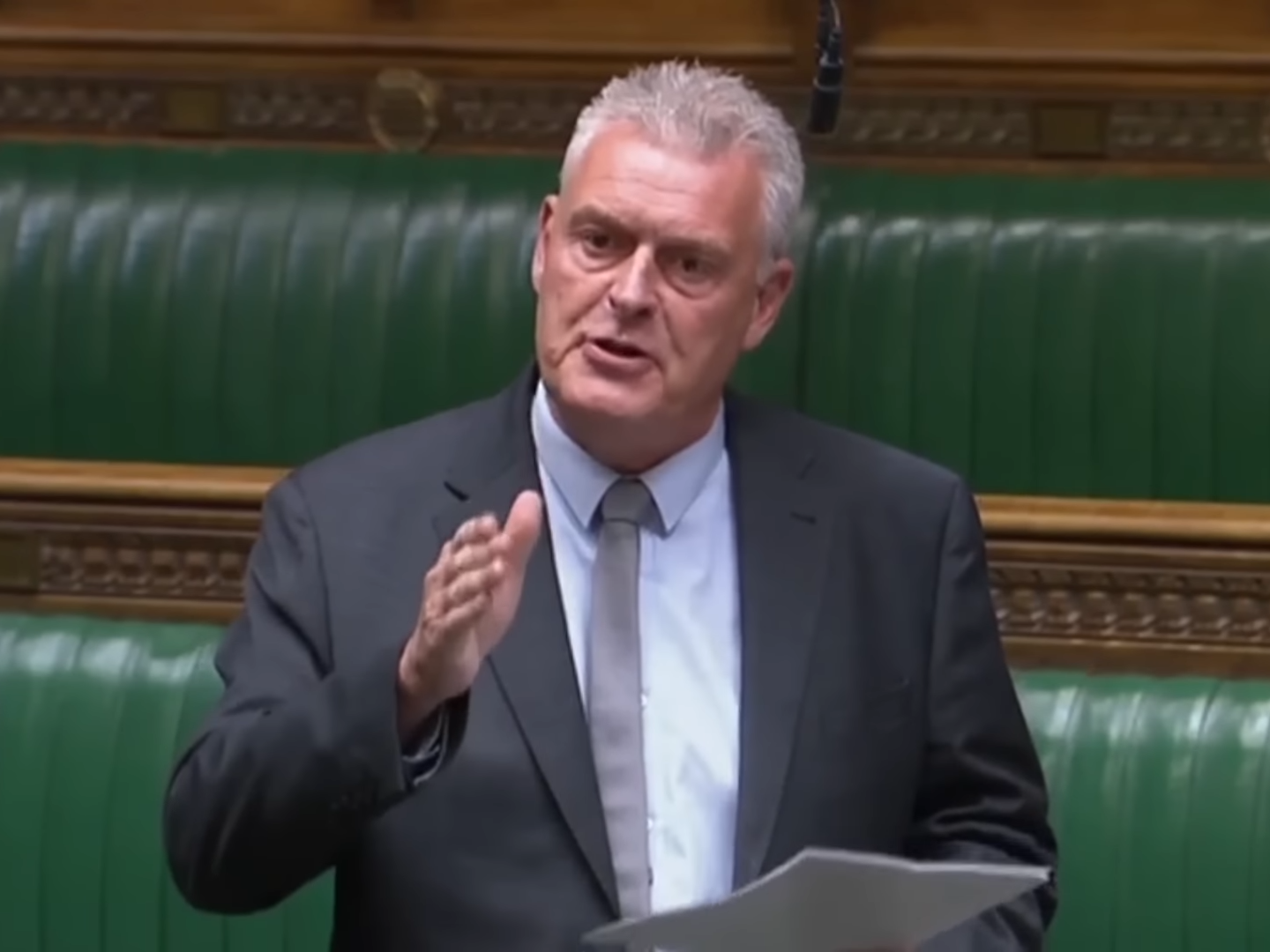
Lee Anderson, Conservative MP for Ashfield in Nottinghamshire, summed it up this week, telling the House of Commons that people were using food banks because they “cannot cook properly” and “cannot budget”.
Meals can be cooked for just 30p, said Anderson, who claimed £220,000 in expenses last year and has access to taxpayer-subsidised meals and alcohol in parliament.
No one who has any conception of life on the breadline in Britain could truly believe such portrayals, says Lexie who has been taking part in Covid Realities, a project run by the Universities of York and Brimingham to document life for people on low incomes during the pandemic.
“Anyone that believes that narrative, I’d like them to come and live my life for one day,” she says. “There is no luxury when you’re stripping your children down in the bathroom when it’s cold, washing them with a wet flannel.
“Being unable to buy new school shoes when your child’s toes are poking through the end is not living in luxury. Believe me, if we could have it any other way we wouldn’t be living like this.
“Do you think I want my children to be eating nothing but processed crap, day in day out, because I can’t afford to give them a healthy meal?
“Nobody wants to ask their children to walk around in another layer of clothes because the hot water bottle and the three layers they’ve got on already isn’t enough to keep them warm.”
The myth that people are poor because they are lazy has a long pedigree, despite having precious little evidence to back it up. A 2012 pamphlet by a group of Conservative politicians lambasted UK citizens as the “worst idlers in the world” and claimed the country’s workplaces “encourage laziness”.
Among the authors of this tirade were no fewer than four members of the current cabinet: Liz Truss, Kwasi Kwarteng, Dominic Raab and Priti Patel.
It was around the same time that David Cameron’s government popularised the term “strivers versus skivers”, an inherently divisive depiction of society that implied there were large numbers of people who simply didn’t want jobs, and that those lucky enough to have them should be angry about it.
Parris insisted that, while he could not survive seven days on the meagre existence allowed by state benefits, it was right that 3 million unemployed people should do just that
At the time, unemployment had spiked to its highest level since the 1980s due to a global financial crisis and the austerity policies enacted in response. But the message has clearly resonated with voters over the years.
In 1984, the Times columnist Matthew Parris, who was then a fresh-faced Tory MP, sought to prove that the Thatcher government had been right to cut benefit payments by 5 per cent. He spent a week living on the dole in Newcastle, filmed by an ITV camera crew.
So confident was Parris in his own budgeting prowess that he predicted he would end the week with £3 of savings. By the seventh day, he had gone over budget and his council house was left in darkness, without heating. The 22-minute film is a masterful exposition of cognitive dissonance as the young MP slowly realises that, contrary to his belief, the unemployed people he meets are not lazy at all.
Two days in, he decides to go for a pint of bitter at the working mens’ club, and then takes a trip to watch Newcastle United play football. Such indulgences, he concedes, are not luxuries but are in fact really rather understandable when in his own words “there is very little for me to do; very little I can afford to do”.
Unperturbed by his chastening experience, Parris stuck to his guns, insisting that, while he could not survive seven days on the meagre existence allowed by state benefits, it was right that 3 million unemployed people should do just that. He argued that poverty was a fair price to pay to ensure that the unemployed would not fall victim to the greater evil of becoming dependent on handouts.
The situation faced by struggling families is strikingly similar to that in 1984, but there is an important difference. It can no longer be argued, even by the most ardent Thatcherite, that millions of people facing hardship are in a situation of their own making. Unemployment is low, yet poverty is rising. The vast majority affected by this cost of living crisis are in work. But after 14 years of lacklustre economic growth and stagnant wages, they just aren’t paid enough.
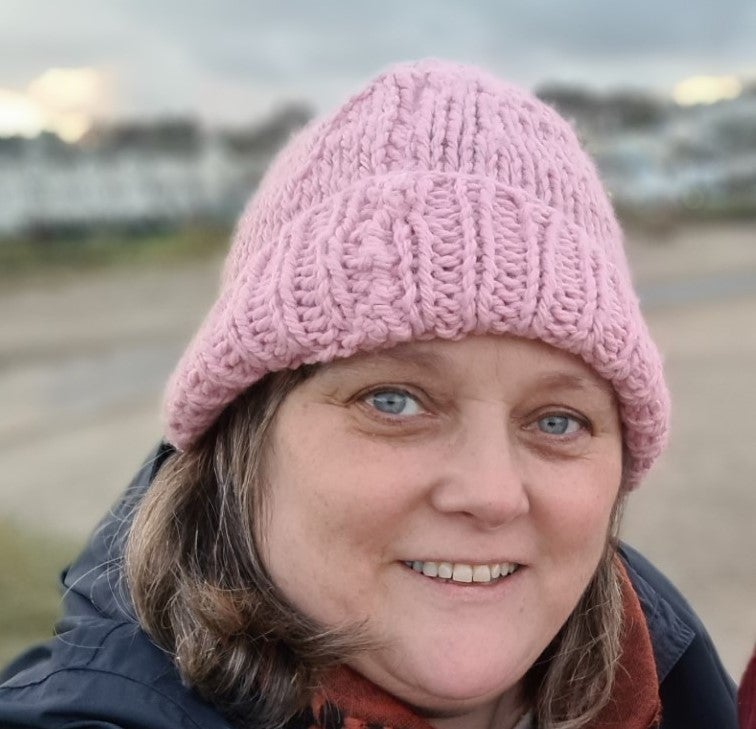
Caroline Rice, single working mother, Northern Ireland
In a small village near Enniskillen, Northern Ireland, 48-year-old teaching assistant Caroline Rice spent the cold winter nights huddled around a coal fire with her daughter because she could not afford heating.
She is dreading what next winter will bring. “It gets really cold here in Northern Ireland. Not everywhere is like London,” she says.
She works, but her income is not enough to get by on. There is no mains gas in the area, and heating oil has more than doubled in price this year. It is not protected by the energy price cap, and the only company that will deliver to Rice’s house recently put up its minimum order to £150.
“I haven’t ordered oil since the start of the pandemic because I would just never have £150. I never have that kind of cash,” she says. The oil that Rice bought in early 2020 has been stretched as far as it will go and is about to run out. She has enough left to eke it out for a couple of weeks.
We have the heating on for half an hour when I wake up my girl for school. That’s it ... How far can you cut back on something that you have continually cut back on for the past year and a half?
“We have the heating on for half an hour when I wake up my girl for school. That’s it. If the house is really cold when I get home from work I put it on for 10 minutes while I light the fire. Once the fire’s lit, the heating’s off.”
“How far can you cut back on something that you have continually cut back on for the past year and a half?”
Even coal is becoming less affordable. It was £6.50 for a bag in Rice’s local shop. Then £8.99 and now it’s £10. “It’s not the cheapest but it’s the most affordable for me because it’s a little at a time.”
Food is also more expensive in the local shop, but Rice has to accept the prices because she can’t afford the trip into town. It’s an example of what’s known as the poverty premium, where living on a very low income is more expensive because of the inability to afford up-front costs.
Rice says her food supplies have dwindled too and the cupboard is now bare. “I used to have a good cupboard of staple foods but there’s nothing left.”
She lives with the constant worry that minor problems – a blown lightbulb, a flat tyre – will result in expenses she cannot afford. She works part time because she needs to take care of her young daughter and childcare is prohibitively expensive.
“I am working. There are people on universal credit who can’t work. They don’t deserve to be judged, because maybe they have a disability, or have young children.”
She believes some politicians have cynically stoked up division and created a system where “people begrudge others that are really struggling”.
She says: “There’s a thought of ‘well he got £200 from the government, why didn’t I get it?’.”
MPs “don’t understand the cost of living crisis at all,” she says. “They are never going to know the reality of not having £150 in your account to put heating oil in the tank, or going to the shop and pricing up everything to make sure you’ve enough money in your purse.”
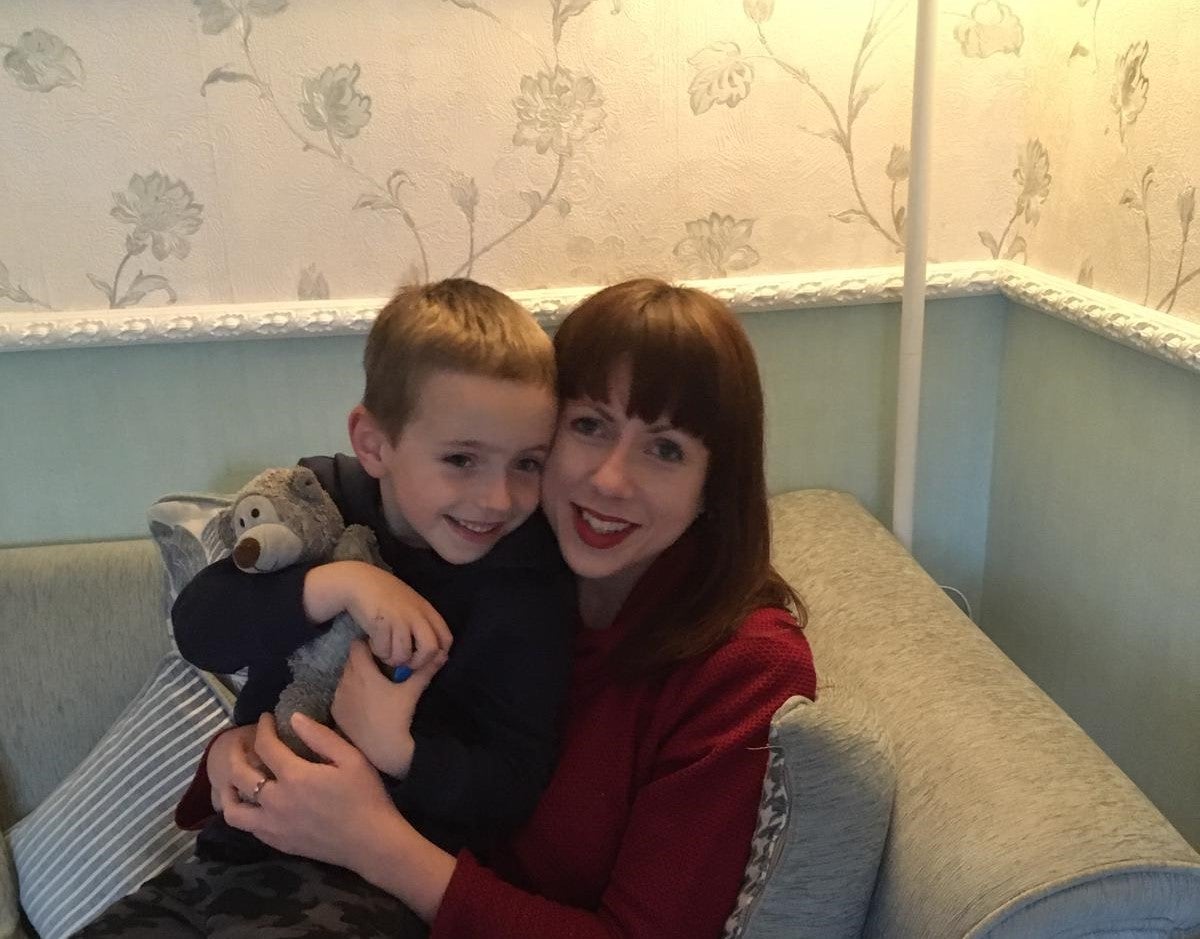
Cathy Millward, 37, Stockport
Cathy Millward has been unable to work due to bipolar disorder. She turned to food banks run by the Trussell Trust last summer to ensure that she and her son Matthew, aged six, could eat. The small pleasures have long gone. Her holiday this year – a trip to Southport for a friend’s birthday – is now doubtful.
“It’s not exactly a cruise in the Caribbean but I worry we can’t go this year, even for one night.”
October’s energy bill increase looms large, and she has no idea how she will pay. Her payments have already gone up from £70 to £150 a month. “It’s just impossible,” she says, trying to laugh things off. “Where are all these prices coming from? It’s like they’ve come out of nowhere.”
“I just don’t know what to plan, even if there is a way of planning things. I’ve cut all the cloth that there is to cut.”
The current situation has made her feel “out of control” and anxious. The thought that she and Matthew could soon be left homeless is real and almost constant. Several neighbours have recently been told they must pay £150 per month more in rent.
“I’m seeing close friends be evicted because they can’t afford rent – people who you think it would never happen to,” she says. “If that happens I’ll just be trapped. I don’t know what I will do because I can’t even afford to move. I don’t have any money for a removal van.
“I’m just waiting for my landlord to say that the rent will be an extra £100. That’s really, really worrying for me as a single mum. I don’t want my little boy’s life being turned upside down.
“I know our house is really old... It’s a bit crummy but it’s our home, it’s security, it’s what we know.”
Occasionally, she chastises herself when she snaps at her son for not finishing his tea. “It’s lost on him, he’s six.” But Cathy knows any morsel not eaten means room must be found in the budget when it simply doesn’t exist.
What next?
The situation facing millions of low-income families is set to worsen dramatically this year as inflation hits 10 per cent. That means prices will rise twice as fast as average wages and more than three times faster than benefits payments. In truth it will likely be even worse, because prices for essential goods which poorer households spend a bigger chunk of their incomes on, are rising fastest.
The government can choose to do something about this. So far, they haven’t. I honestly do not see how they can expect people to get through this year without support
While inflation is set to hit 10 per cent this year, the price of essential goods has risen much more. Fuel is up 23 per cent, energy is going up 54 per cent, clothing is up 12 per cent, milk 17 per cent and tomatoes 14 per cent.
Britain’s poorest families will see a real-term cut to their incomes of £663. That comes on top of a £1,000-a-year cut in November, when a temporary increase in benefits was axed. Even before this year’s crisis, the basic level of unemployment support (£73 a week) is less than half the amount needed to avoid absolute poverty.
A benefit cap and a two-child limit introduced under the Cameron government squeezed low-income families further, pushing more into poverty.
A broad consensus is developing that what’s now desperately needed is a major package of targeted financial support to help those most in need.
Sunak – the wealthiest chancellor in British history – has so far ignored calls to help, despite warnings of the human cost. “The government can choose to do something about this,” says Ogilvie at CPAG. “So far, they haven’t made that choice, but I honestly do not see how they can expect people to get through this year without giving them more support.”
Clearly exasperated, Ogilvie says she has run out of advice to give people. “It’s a horrible situation to be in. There is a huge number of families without the things they need to live on.”
Ogilvie believes the chancellor has failed the people who need him most. “Ultimately, kids are paying the price for decisions that the government is making.
“All the things that go into a child having a decent start in life are being stripped away, and there’s nothing – nothing – left for parents to do.”
In Enniskillen, Rice hopes that the collective hardship of this crisis might mean that more people begin to appreciate what life is like for people struggling in the UK. “It’s an awful thing to say… I wouldn’t wish anyone to be in a position where they have to ration heating or food, but the only thing I can hope for is that people will start seeing that it’s not easy.
“I hope they’ll start to think: ‘Can you imagine the stress? Can you imagine the bills? Can you imagine how hard it would be to live like this?’
“All I can hope for is that they’ll turn around and go, ‘You know what, this is just not good enough any more.’”
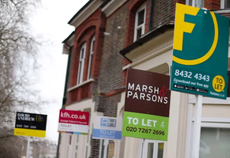



Join our commenting forum
Join thought-provoking conversations, follow other Independent readers and see their replies
Comments